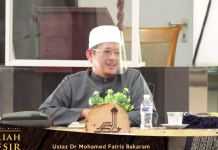بسم الله الرحمن الرحيم
Bismi-llāhi r-raḥmāni r-raḥīm
In the name of Allah, Most Gracious, Most Merciful
اللهم صلي على سيدنا محمد وعلى اله وصحبه وسلم
Allahumma salli ala Sayyidina Muhammad wa ala alihi wa sahbihi wasallim
O Allah, send your peace and blessings upon our Master Muhammad and upon his family and companions
This article is a summary of takeaways from Ustaz Dr Mohamed Fatris Bakaram’s Tafsir Online Lecture on 15th November 2020. Summaries of previous lectures on Surah Maryam, Surah Taha, Surah Al-Anbiya’ and Surah Al-Hajj can be found here. The previous lecture of Surah Al-Mu’minun can be found here.
Continuation of the Tafsir of Surah Al-Mu’minun
O people of Quraysh
قَدْ كَانَتْ ءَايَـٰتِى تُتْلَىٰ عَلَيْكُمْ فَكُنتُمْ عَلَىٰٓ أَعْقَـٰبِكُمْ تَنكِصُونَ
Indeed My Verses used to be recited to you (O Quraysh), but you used to turn. [23:66]
This verse is addressed to the disbelievers in Makkah. If you remember, at the start of Surah Al-Mu’minun, we saw the characteristics of the believers – those who have succeeded in inheriting Al-Firdaus.
After that, we were narrated several stories of the prophets AS. First, there was the story of Prophet Nuh AS and his people who stubbornly rejected the truth. Next, we heard about the story of Prophet Hud AS, whose people similarly rejected the truth.
This was followed with the story of Prophet Musa AS, in which Firaun and his troops were destroyed by Allah SWT and Bani Israel was granted freedom from slavery. In the final lesson before this, we discussed that Prophet Isa AS had been sent to these people to Bani Israel, where they treated him with cruelty.
Now these new verses were revealed addressing the Quraysh saying, “O Quraysh, did you not see what happened to the people of the past, when they were stubborn and arrogant towards their prophets?
The people of Prophet Nuh AS and the people of Prophet Hud AS were destroyed. Firaun and his troops were defeated. O Quraysh, O people of Makkah, O Ummah of Rasulullah SAW, now has come your turn to receive the message. What will you do?”
Allah addresses the people of Quraysh, who stubbornly deny Prophet Muhammad SAW, despite seeing for themselves the clear signs of his prophethood and the clear truths in his message.
Allah shows them in the previous verses that the people who refuse to accept the message of Islam, in spite of the many signs and evidence shown to them, are given a punishment by Allah SWT.
So here Allah SWT tells the people, that when the day comes when punishment befalls on them, there is no turning back. No amount of crying, begging and repentance will help them. When the Day of Judgement arrives, Allah SWT will remind them, “Have I not shown you my signs? The verses of the Qur’an were recited unto you and you turned away from them.”
The Quraysh’s Pride
مُسْتَكْبِرِينَ بِهِۦ سَـٰمِرًۭا تَهْجُرُونَ
In arrogance regarding it, conversing by night, speaking evil. [23:67]
The word ‘mustakbireen’ comes from the root word “kaf-ba-ra’”. These letters form the word ‘Kabeer’ meaning ‘big’ and ‘Akbar’ meaning ‘biggest’. ‘Allahuakhbar’ means ‘Allah is the Greatest’.
So, the word ‘mustakbireen’ tells us that the people of Quraysh used to see themselves as great. In their arrogance, they would inflate their status and be boastful and proud.
In the Arabic language, a proud person could be referred to as having “Takabbur” and very rarely, “Istikbar”. ‘Mustakbireen’ comes in the same context. Allah SWT tells us that this was the situation which they were in. When the verses of Qur’an were revealed to them, they turned away from them full of pride and arrogance.
The word ‘bihi’ means ‘with it’. What does ‘it’ refer to? There are two opinions regarding this. The first is that ‘it’ refers to the Holy Land of Makkah. This land has been blessed over generations since the time of Prophet Ibrahim and Ismail AS, when the Ka’ba was built.
It is the location where the House of Allah, Masjidil Haram stands, and the focal point of Arabs across the land. So, the people of Quraysh, knowing that they have been honoured as caretakers of the Ka’ba for centuries, considered themselves highly.
They have been respected and honoured, with the Ka’ba and idols that they maintain for pilgrims from across the lands. As such, they were unwilling to give up their idol-worship and follow Muhammad SAW and his message of One God.
So, the first opinion is that their pride comes from them being from the Holy Land. The second opinion is that they were arrogant ‘towards the Qur’an’. This opinion holds because the previous verse speaks about the Qur’an. Someone who is proud towards the Qur’an does not regard the Qur’an. They look down upon it and brush it off as meaningless and worthless words.
The word ‘saamiran’ comes from the Arabic word ‘samrun’ which refers to the pale glow emanating from the moon. The light from the Sun shines brightly and warmly, but the light from the moon at night is a paler glow. Even the shadows cast by moonlight are not clear.
This cool glow is called ‘samr’ and is where the word ‘saamiran’ comes from. The Arabs also had a practice of congregating at night that they used to call ‘saamir’. So Allah SWT tells the Quraysh that when the Quran was revealed to them, they were proud towards it such that when they used to meet at night, they would gather and speak ill of it.
‘Tahjurun’ means idle speech and conversations that are rampant with untruths, vulgarities, mockery, and condemnations. The Quraysh had a habit of coming together at night to chat about things that brought no good. They would speak nonsense about Rasulullah SAW, mocking him and plotting against him.
Some of you who have Arab friends and families might know that up until today, whenever there is a gathering or party of some sort that occurs at night, it will be referred to by them as a ‘samrah’. It is common amongst the people from Yemen and the Gulf countries. The Quraysh did not merely gather for fun, they would have a ‘samrah’ and then engage in ‘tahjurun’ in it. This practice was what was being criticised by Allah SWT.
Why Did They Reject the Truth?
أَفَلَمْ يَدَّبَّرُوا۟ ٱلْقَوْلَ أَمْ جَآءَهُم مَّا لَمْ يَأْتِ ءَابَآءَهُمُ ٱلْأَوَّلِينَ
Then, is it that they did not ponder over the Speech (of Allah), or there has come to them something that did not come to their forefathers? [23:68]
After highlighting the stories of past prophets AS and his people, Allah SWT addresses the Quraysh, inviting them to reflect on their own actions, rather than to continue drifting in stubborn arrogance without any self-reflection. So, Allah SWT asks two questions:
(1) Have they never wanted to pause, think about, reflect, and appreciate the revelation of Allah SWT (Al-Qur’an)?
(2) Have they received something unlike that which has been received by their forefathers?
There are two interpretations for the second question. The first opinion says that Allah SWT is saying, “O Quraysh, when you received the revelation from the messenger that I sent, Muhammad SAW, did you not realise that the contents of the Qu’ran are similar to the books and messages of previous prophets?”.
It was as though the Quraysh was saying, “Oh it’s such a shame that the books of the past are no longer around. The message has been lost. The Qur’an that we got now is so different from what people used to get!”.
The second interpretation is that Allah SWT is saying, “O Quraysh, you choose to be stubborn and reject the truth. Do you happen to have a sort of guarantee or protection from Me that you will be saved? Do you not fear or worry that the destruction that happened to people of the past would happen to you as well?”
There were two questions asked by Allah SWT to address the Quraysh’s stubbornness in rejecting the message. One identifies the true reason behind their rejection of the truth, while the other highlights an excuse used by them that is untrue.
Between these two questions, it is clear that (1) is the true source of the problem. The Quraysh did not want to listen and internalise the message that was being received by them. They did not calmly reflect upon the words that were being relayed to them.
(2) was used as an excuse. We know that the Qur’an is revelation from Allah SWT, it is not unlike what previous prophets have received. We know that the Quraysh was not given any protection from Allah SWT, that they were equally likely to receive punishment from Allah SWT.
Did They Not Know Muhammad SAW?
أَمْ لَمْ يَعْرِفُوا۟ رَسُولَهُمْ فَهُمْ لَهُۥ مُنكِرُونَ
Or is it that they did not recognize their Messenger (Muhammad SAW) so they deny him? [23:69]
My dear brothers and sisters, if we had been amongst the Quraysh, and this question was to be posed to us, how would we have answered it? Clearly, we would not have been able to deny knowing Muhammad SAW.
The Quraysh knew Prophet Muhammad SAW very well. They recognised since his birth who he was. He was the grandson of Abdul Muttalib, someone who was famous and held a strong belief in the One God.
In the year in which Rasulullah SAW was born, and the troops of Abraha came to destroy the Ka’ba, the people of Quraysh consulted Abdul Muttalib seeking his advice. Abdul Muttalib replied saying, “This house has a God that protects it.”.
He was not reliant on idols to defend the Ka’ba, he was amongst the Hanif, people who strongly believe that God is One. By Allah SWT’ s Power, the Ka’ba was protected from destruction.
The Quraysh recognised that Muhammad SAW’s father had passed away before his birth, that after his mother’s death, he had been taken care of by Abdul Muttalib himself. They knew him SAW as a boy who was raised by Abu Talib after Abdul Muttalib’s passing.
He was a youth who would never be involved in the ludicrous exploits of the youth of his time, someone who was honoured and recognised by his excellent character and honourable speech.
He was praised and respected by the people of Makkah; he was even given the title “As-Saadiq Al-Ameen”. He was the first youth who, when entrusted by Khadijah with a trade caravan to Sham, returned with profits that were unprecedented.
The reason for this was his skill in trading and his honesty such that he did not take even a small portion of the profit for himself. Muhammad SAW was the go-to person whenever anyone wanted to travel and had to leave behind their wealth. It was known that Muhammad SAW could be trusted and would never disappoint or cheat them.
Allah SWT asks the Quraysh if they did not truly recognise who Muhammad SAW was. He was not a stranger or foreigner to them. They all knew him and had no reason to doubt his credibility. This was just another mere excuse for them to reject his message.
Knowing Rasulullah SAW Does Not Guarantee Our Safety
There is a lesson for all of us. Just because we know the Prophet SAW, it does not mean that we are guaranteed to be amongst his SAW’s Ummah. It is important to get to know the Prophet SAW. How else would we be able to love him? However, just knowing him will not be enough to make us good people.
If you were to compare yourself to Abu Jahal or Abu Lahab, who do you think knew Prophet Muhammad SAW better? We have never met Rasulullah SAW before – we do not know his character, have never heard his voice, have never seen him growing up. We do not know how he lived, how he treated his wives, how he interacted with the people he came across.
So, knowing Rasulullah SAW does not guarantee our safety. That knowledge of Rasulullah SAW must instil a love in us for him SAW, evoke our respect and confidence towards him, and ensure that we want to follow and obey him SAW. Only then would this knowledge be of benefit to us.
In Islam, learning is important, knowledge is essential, information is crucial. We cannot worship Allah SWT without knowledge – not knowing Rasulullah SAW is problematic, not knowing the Qur’an is problematic, not knowing the laws of Islam is problematic.
Learning and knowing is key. However, only learning and leaving it at that is insufficient. We need to have a commitment to follow and carry out whatever has been commanded to us by Allah SWT through his messenger SAW.
أَمْ يَقُولُونَ بِهِۦ جِنَّةٌۢ ۚ بَلْ جَآءَهُم بِٱلْحَقِّ وَأَكْثَرُهُمْ لِلْحَقِّ كَـٰرِهُونَ
Or do they say, “In him is madness”? Rather, he brought them the truth, but most of them are hateful of the truth. [23:70]
They claimed that he has gone insane, that he had been possessed by Jinn, that he was no longer thinking straight. The reality was that they knew that Rasulullah SAW brought the truth to them.
However, they had a deep hatred towards the truth – they resented it. When you hate the truth, you will come up with all sorts of excuses just so you can reject it. It was not that they did not receive the truth or that the truth was not revealed to them. They knew the truth; they just did not like it.
Key Takeaways for the Believers
This was the reason for the Quraysh’s rejection of the message: They did not reflect upon the Qur’an.
These were the excuses that they had:
- They felt they were special
My brothers and sisters, have a look within yourselves. Are there any amongst you who thinks of yourself as special? Do you think that you will be safe from Allah SWT’s punishment?
When you commit a sin, do you say, ‘Oh! That was just a small sin, it’s ok. I pray way more than I commit sins. I’m sure it makes up for whatever faults I have…” or “Gossip is no big deal. Missing a few prayers here and there is not the end of the world.
When Ramadhan comes, my sins will be wiped away, just as promised in the hadith of Rasulullah SAW…” or “You think my deeds are not much? Well, not to worry! When Lailatul Qadr comes, I will be rewarded for my deeds way more than 1,000 months. Just take a chill pill. Don’t worry so much!”.
Dear brothers and sisters, we want to be careful. We fear that there might be a hint of the characteristics of the Quraysh within us. They believed that they were special. In the past, whenever a people were stubborn in rejecting the truth, Allah SWT destroyed them. Today, when people are stubborn, Allah SWT makes them hopeful of being saved.
There is a hadith where Rasulullah SAW has warned us that a believer, whenever he commits one bad deed, he feels like there is a humongous mountain hanging over him just waiting for the time to come crashing on them.
A munafiq (hypocrite) on the other hand, when he commits one sin, he feels that it is as though there is a fly landing on his nose – it is easily brushed off, you don’t even need to raise your hand, you can just puff your breath and it flies away. We fear having the qualities of a munafiq within us. May Allah SWT protect us all.
- They did not recognise the Prophet SAW
Have a look at yourself. Do you think that merely knowing the Prophet SAW would make you safe from punishment? Some of you might have read the Syama’il of the Prophet SAW so that you know how he used to look like and act.
Some of you might have collected material at ‘Maulid’s and religious events. Some of you may have recited lots of Salawat upon Prophet Muhammad SAW. You think that you know the Prophet SAW. Well, it is not just about knowing him SAW.
Have a look, do you have love of the Prophet SAW in your life? Do you follow him? Are you obedient towards his teachings? Do you have a desire and longing to receive his Syafa’at in the Hereafter? Do you worry that upon your return to Allah SWT, Rasulullah SAW does not recognise you as one of his Ummah, despite you calling desperately to him SAW? Is there such a fear in your heart? If not, then regardless of whether you memorise the whole book of Seerah, it will be of no use to you.
- They said Rasulullah SAW was “crazy”
Alhamdulillah, we are not amongst those who considered Rasulullah SAW crazy. We honour him and believe firmly that he brought us the truth from Allah SWT. However, even if we are not alike to the disbelievers, we need to be cautious that we do not have a hint of their belief. What do I mean by that?
Well, a crazy person is one who does not speak rationally. His speech is baseless and illogical. The Quraysh refused to believe in Rasulullah SAW so they accused him of insanity. My brothers and sisters, has there not been amongst the Muslims of today, people who claim to be Muslims but who question the hadith of the Prophet SAW?
Are there not people who say the Shahadah and who become angry and offended when Islam is being mocked, however their attitude towards the words of Rasulullah SAW is as though whatever the Prophet SAW said is no longer relevant and logical in today’s time?
May Allah SWT protect us so that we do not reach the extent of disbelief of the disbelievers of Quraysh. At the same time, we want to make sure that we do not even have a hint of their beliefs in our hearts.
Rasulullah SAW is never illogical in his speech. There is nothing that he says that does not make sense – if there was to be something you cannot understand, it is out of your own limitation in understanding the Prophet SAW’s speech.
Perhaps we are stopped because Allah SWT has not yet opened the doors to the secret of its meaning to us. Perhaps it is not yet time for us to internalise its true meaning or to act and apply that knowledge. Perhaps someday, when we strive to act upon it, then Allah SWT will ease our affairs.
Here is an example, perhaps you have heard of the hadith which says that if a fly lands on your drink, then push the whole fly into your drink. It is said that one wing contains a poison and the other contains a cure. People say this is illogical and unlikely.
Well, consider that it has not come the time for us to know the truth behind how this works. Perhaps there are scientists out there who have found this out and we do not know about this yet. Well, at the time of the Prophet SAW, there was no way for them to verify this. The time had not come for them to know the truth.
Another example is how the phases of development of the embryo was described in the Qur’an and the hadith. At the time when this knowledge was conveyed to the Sahabah, there was no way for the Sahabah to authenticate this.
Today, technology and medicine has advanced in ways that were not possible before. We know for a fact that what was revealed over a thousand years ago is the truth.
So as believers, when a hadith comes to us that has been proven authentic, then we accept it. Do not doubt and question it, saying that it is illogical. The hadith may seem illogical to those who do not understand. Do not question them, for fear that we might start developing characteristics not unlike that of the disbelieving people.
Let us discard any of these characteristics from within ourselves. Ensure that we do not become a people who are stubborn in rejecting the truth because we do not reflect upon the revelation from Allah SWT.
Closing Words: Hold Onto the Truth
وَلَوِ ٱتَّبَعَ ٱلْحَقُّ أَهْوَآءَهُمْ لَفَسَدَتِ ٱلسَّمَـٰوَٰتُ وَٱلْأَرْضُ وَمَن فِيهِنَّ ۚ بَلْ أَتَيْنَـٰهُم بِذِكْرِهِمْ فَهُمْ عَن ذِكْرِهِم مُّعْرِضُونَ
Had the truth followed their desires, the heavens, the Earth, and all those in them would have certainly been corrupted. In fact, We have brought them (the means to) their glory, but they turn away from it. [23:71]
When the truth comes to you, you are to follow it and abide by it. It is not our role to twist and bend the truth so that it fits what we desire.
Imam Ibn Kathir, in interpreting verses 71 to 74, brings a hadith narration from Imam Ahmad and Imam Hakim. Rasulullah SAW narrates how he had been sleeping once and he dreamt that two angels came towards him as he was lying down.
One stood at his head and another at his feet. Rasulullah SAW then said that the angel at his feet spoke to the angel at his head saying, “What is the best metaphor for the person that you see here towards his Ummah?”.
The angel at his head replied, “The metaphor for this man is like a group of people who are travelling on a long voyage. In the middle of their journey, they realised that their supplies had fallen short and they cannot do anything about it. They were too far away to return home or to proceed with their journey.
At that moment, a man came to them saying, ‘Would you like me to show you a place where there is abundant water, food and shelter? This could be a suitable location for you to gather your supplies before you proceed on your journey. Would you like me to show you the place?’.
This group of voyagers would say, ‘Of course! We are desperately in need’. The man then responded, ‘I will show it to you, but promise me that if you find that the place is just as I have promised you, then you will follow me.’.
The people agreed to this term. This man then brings them to a place that had lush vegetation and greenery, with a flowing water source and the comfort of cool shade from the hot sun.
These people enjoyed themselves at this place until the man came to them to remind them of their promise. He told them that this place they were in is not perfect and that there is another location that is far better than this one had been.
He asked that they fulfilled their promise. Some of the people did, remembering what goodness they had already gotten out of following the man’s words. Others refused to follow, saying what they had is already comfortable and satisfactory.”
So as believers, we believe that the message brought by the Prophet SAW is the truth revealed. Whatever comes from him SAW should be accepted and obeyed. We know that the Qur’an was not forged or made up by human hands.
Do not become like the men in the hadith who think they have attained paradise already. What they had was merely temporary and is unmatched in value and honour to what is to come in the Hereafter. Do not bend the truth to suit out personal desires. Rather, make our desires bow to the demands of Allah SWT and His Prophet SAW.
May Allah SWT preserve us and protect our Iman. May Allah SWT heal our hearts and instil in it Taqwa. May Allah SWT protect us from His Hellfire, His Displeasure, His Curse, and His Punishment. May Allah SWT unite us altogether in His Paradise. Ameen.
Forgive me for any of my mistakes and shortcomings. Allah bears witness that I truly love and care for all of you as my brothers and sisters. Make du’a for me and for all of us. May we meet again next week.
Assalamu’alaikum warahmatullahi wabarakatuh.
——————–
Summary by: Arina Adom
Arina Adom is a lover of learning who takes on the world with an open mind. Resourceful and adaptable, always ready to take on new challenges. Comfortable working with diverse groups of people, yet able to work independently. Thrives under pressure. Currently seeking a meaningful career that enables her to impact lives directly and bring about positive changes in the lives of others in the community.
Arina graduated with a degree in Science ( Hons ), Life Science from NUS. She is currently taking a diploma in Quran and Sunnah Studies from Al Zuhri.
Watch Kuliah Tafsir again at
Masjid Darul Makmur’s Youtube
Watch and follow Kuliah Tafsir weekly
every Sunday after solat Maghrib

organised by Masjid Darul Makmur
Your contributions are appreciated. Get more details by clicking the image below.











